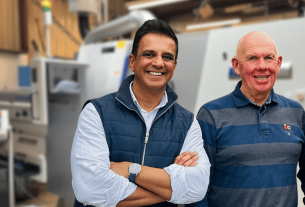That’s the message from Jo Reid, managing director of digital agency Calvium, which designs and develops robust mobile solutions that deliver business critical services. The “fail fast, fail often” mantra is the foundation for agile companies to deliver large projects and to change organisational culture.
This philosophy responds to the many and well-known failures in large scale projects, whether that’s in infrastructure, IT or organisational structural changes. These often start off with rigorous and detailed plans, which set the projects on a course that allows no deviation.
‘Fail fast, fail often, succeed’ takes the opposite approach, starting off with micro scale developments, learning, adjusting, repeating and then rolling out to achieve wider objectives. If you fail early in a project, you win. It is a strategy to intelligently iterate relentlessly.
Jo Reid said: “Many businesses fear getting things wrong or failure, with leaders sometimes viewing it as a reflection of their personal competence. But often it is not. At the start of huge projects no-one will be able to predict every twist and turn, every complication. There will always be something that hasn’t been considered at the outset.
“Which is why we advocate a ‘fail fast, fail often, succeed’ approach. So, we start off going in one direction and because we test the viability at each stage, we may need to tack to the left or the right, and through an iterative process we’ll reach the desired destination. It’s only by looking at the failures, to see what has gone wrong and what has gone right, that you can progress in the most efficient manner, in the right direction.
“And it is vital that this is done in a non-judgemental culture. People who fear failure will not be empowered to take risks; things sometimes go wrong but sometimes go spectacularly right. It’s only through taking risks that products and services can evolve and improve, and large-scale projects delivered on time and in budget.”
Famous people give their own perspective on failure:
- Winston Churchill: “Success is stumbling from failure to failure with no loss of enthusiasm.”
- Nelson Mandela: “Do not judge me by my successes, judge me by how many times I fell down and got back up again.”
- Samuel Beckett: “Ever tried. Ever failed. No matter. Try Again. Fail again. Fail better.”
- J.K. Rowling: “It is impossible to live without failing at something, unless you live so cautiously that you might as well not have lived at all, in which case you have failed by default.”
- Thomas Edison: “I have not failed. I’ve just found 10,000 ways that won’t work.” On the 10,001st, he created the light bulb!
- Bill Gates: “It’s fine to celebrate success but it is more important to heed the lessons of failure.”
- Morihei Ueshiba (founder of the martial art of aikido): “Failure is the key to success; each mistake teaches us something.”
- Calvin Coolidge: “Nothing in this world can take the place of persistence. Talent will not: nothing is more common than unsuccessful men with talent. Genius will not; unrewarded genius is almost a proverb. Education will not: the world is full of educated derelicts. Persistence and determination alone are omnipotent.”
- Theodore Roosevelt: “Far better is it to dare mighty things, to win glorious triumphs, even though checkered by failure… than to rank with those poor spirits who neither enjoy nor suffer much, because they live in a gray twilight that knows not victory nor defeat.”
- Richard Branson: “Do not be embarrassed by your failures, learn from them and start again.”
- Anonymous: “Never let success get to your head. Never let failure get to your heart.”
- Henry Ford: “Failure is simply opportunity to begin again, this time more intelligently.”
- Japanese Proverb: “Fall down seven times, stand up eight.”
- Michael Jordan: “I’ve missed more than 9000 shots in my career. I’ve lost almost 300 games. 26 times, I’ve been trusted to take the game winning shot and missed. I’ve failed over and over and over again in my life. And that is why I succeed.”
- William Ward: “Failure is not fatal. Failure should be our teacher, not our undertaker. It should challenge us to new heights of accomplishments, not pull us to new depths of despair. From honest failure can come valuable experience.”
Calvium has worked with major companies throughout the world to develop their strategies and cultures of innovation, including Rolls Royce, across many sectors including tourism, local authorities, healthcare, logistics and aerospace. The team delivers bespoke innovation workshops as a catalyst to engage, inspire and empower leaders, managers and staff within organisations. For more information about the work of Calvium, visit www.calvium.com





